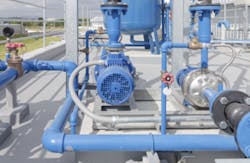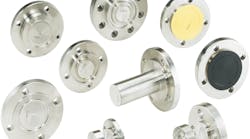Larry Bachus
("The Pump Guy")
Mr. Pump Guy,
One of my municipal government clients has a wet-pit submersible wastewater pump that had a seal failure. The pump was provided with a lifetime warranty on the seals, and it was put into service less than five years ago.
My client called the pump manufacturer’s rep for warranty repair. The pump factory pulled the pump from service and disassembled it. The manufacturer responded that the seal failure was caused by “ragging” of the pump and, therefore, was not covered by warranty.
My client’s position is that this is unacceptable. The pump manufacturer knew it was providing these pumps for unscreened, raw sewage. This was stated in the pump spec. Any reasonable person would expect rags and other material to pass through this pump. The pump company provided a “fitness of use/merchantability” warranty. They also provided a lifetime warranty on the seals. Now my client has asked my opinion.
I agree with my client; rags are expected in raw sewage. Rags shouldn’t cause the pump seal to fail.
However, since the manufacturer’s warranty really only covers “defects in material and workmanship,” I question whether the pump manufacturer should replace the seal at no cost due to the lifetime seal warranty.
Should the burden of proof be on my client to prove that the seal was defective in either material and/or workmanship? Is the mere fact that the seal failed under the intended and normal use sufficient to insist the manufacturer replace it under the lifetime seal warranty?
I would greatly appreciate your opinion on this.
Thanks,
Rob L. PE, MBA
Municipal Engineering
Hello Rob,
Yes! A rag (cloth, mop head, rope, dental floss, old shirt, etc.) can lodge into the seal area on a submersible wastewater pump and cause the seal to fail prematurely.
Yes! A pump designed and marketed for unscreened raw sewage should have design features that prevent rags from lodging into the seal area.
Warranty vs. Guarantee … Both are legal instruments designed to protect the consumer. The main difference lies in the expectation of one over the other.
With a guarantee, the pump manufacturer normally offers to totally replace a defective pump, or return the consumer’s purchase price if the product proves defective or below a stated performance standard. An example would be the famous “money-back” guarantee. A guarantee is normally offered by a pump manufacturer.
A pump (or seal) distributor, dealer, or retailer normally offers a pump warranty. If the pump manufacturer also sells pumps to the end-user, a pump manufacturer can also offer a warranty. With a warranty, the seller offers to repair the defective or substandard product.
A “limited warranty” attaches conditions (time, place, performance) to the offer to repair. Examples of a limited pump or seal warranty might be:
- An offer to repair a pump “within 60 days of purchase”; or
- An offer to repair a pump “provided the pump is installed indoor”; or
- An offer to repair a mechanical seal “provided all damaged parts are returned to the factory.”
If the manufacturer of this pump offered a lifetime guarantee against premature mechanical seal failure, the pump manufacturer should replace the seal and install a new seal onto the pump shaft at no charge to the client. If the pump manufacturer offered a lifetime warranty on the seal, the manufacturer should repair the seal at no cost.
However, there are few instances where the pump manufacturer is also the mechanical seal manufacturer. As a general rule, pump companies don’t make seals, and seal companies don’t make pumps. The seal is a contracted part of the new pump, just as tires and batteries are contracted parts of a new car.
Most automobile guarantees will say something like: This vehicle carries a factory guarantee for 50,000 miles except for the tires and battery, which carry their own guarantee from their manufacturer. You would go to the tire manufacturer for a premature tire failure, or the battery manufacturer for a leaking battery.
I have read many pump company guarantees. Many pump companies offer “limited guarantees.” Most written guarantees are in the pump’s owner’s manual. Generally, bearings and seals are excluded from the pump guarantee. And the pump guarantee itself is loaded with “burden-of-proof” factors that can limit or cancel the guarantee. Examples include:
- The customer must prove that the pump was operated at best efficiency.
- The customer must prove that the temperature and chemical nature of the liquid never varied from the original specification.
- The customer must prove that the suction pipe design was adequate to avoid cavitation and pump starvation.
The mechanical seal distributor might offer a seal repair warranty, valid within a certain time reference (90 days, for example). Some defects (a cracked seal face or parts omitted at assembly) would be evident as leakage in the first seconds or moments of seal and pump operation. Other mechanical seal defects (improper spring tension or incorrect O-ring) will be evident within a few shifts or days of operation causing similar leakage.
If the seal doesn’t leak in the first 60 or 90 days of service, your pump manufacturer might say, “This contracted seal operated four years without leakage. And the pump ran for four years without failure. This means there were no defects in materials or workmanship at the seal company.
“The rag entered into the pump after four years of service. The pump guarantee and the seal warranty have both expired.”
An attorney will take your client’s money and argue the definition of a rag, and how a rag can lodge itself into the seal chamber at 1,800 RPM. The attorneys will litigate the merits of offering a “lifetime limited warranty” that expired after 60 or 90 days of service. The attorney’s fees would cost much more than a replacement seal.
Like automobiles, TVs and refrigerators, unknown and new pump and seal companies can be fair and even generous to their clients to gain market share. The generosity and fairness can fade after the company’s reputation is established.
Clout is also a factor. A small pump/seal/bearing user may never have any clout with manufacturers and dealers. A large pump/seal/bearing user may have automatic clout. If a large pump/seal/bearing consumer has little or no clout, it is time to change providers.
That’s my take. Good luck.
Larry Bachus (“The Pump Guy”)P.S. The next Flow Control Pump Guy Seminar will be in Indianapolis, Indiana, June 16-18, 2015. Contact Matt Migliore at [email protected] for specifics. For my full schedule of upcoming pump trainings, visit www.bachusinc.com/seminars.html.
Larry Bachus, founder of pump services firm Bachus Company Inc., is a regular contributor to Flow Control magazine. He is a pump consultant, lecturer, and inventor based in Nashville, Tennessee. Mr. Bachus is a retired member of ASME and lectures in both English and Spanish. Contact him at [email protected].




